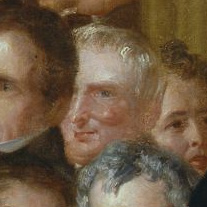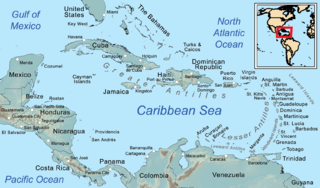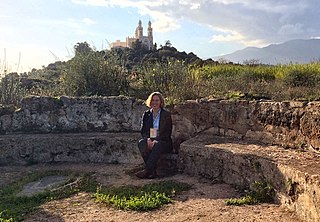Related Research Articles

British Guiana was a British colony, part of the mainland British West Indies, which resides on the northern coast of South America. Since 1966 it has been known as the independent nation of Guyana.

Bryn Mawr College is a women's liberal arts college in Bryn Mawr, Pennsylvania. Founded as a Quaker institution in 1885, Bryn Mawr is one of the Seven Sister colleges, a group of elite, historically women's colleges in the United States, and the Tri-College Consortium along with Haverford College and Swarthmore College. Finally, it is one of 15 Quaker colleges in the United States. The college has an enrollment of about 1,350 undergraduate students and 450 graduate students. It was the first women's college to offer graduate education through a PhD.

Indentured servitude is a form of labor in which a person is contracted to work without salary for a specific number of years. The contract, called an "indenture", may be entered "voluntarily" for purported eventual compensation or debt repayment, or it may be imposed as a judicial punishment. Historically, it has been used to pay for apprenticeships, typically when an apprentice agreed to work for free for a master tradesman to learn a trade. Later it was also used as a way for a person to pay the cost of transportation to colonies in the Americas.

Coolie is a pejorative term used for low-wage labourers, typically of South Asian or East Asian descent.
Indo-Caribbean or Indian-Caribbean people are Indian people in the Caribbean who are descendants of the Jahaji Indian indentured laborers brought by the British, Dutch, and French during the colonial era from the mid-19th century to the early 20th century. A minority are descendants of Indians or other South Asians who immigrated as entrepreneurs, businesspeople, merchants, engineers, doctors, and other professional occupations beginning in the mid-20th century.

Hinduism came to Mauritius when Indians were brought as indentured labour to colonial French and later in much larger numbers to British plantations in Mauritius and neighboring islands of the Indian Ocean. The migrants came primarily from what are now the Indian states of Bihar, Uttar Pradesh, Madhya Pradesh, Jharkhand, Maharashtra, Tamil Nadu, Telangana and Andhra Pradesh.

Hinduism in Fiji has a following primarily among Indo-Fijians, the descendants of indentured workers brought to Fiji by the British as cheap labor for colonial sugarcane plantations. Hindus started arriving in Fiji starting in 1879 and continuing through 1920, when Britain abolished the slavery-like indenture system. Fiji identifies people as "Indo-Fijians" if they can trace their ancestry to the Indian subcontinent, Hindus form about 27.9% the population of Fiji.

The World Anti-Slavery Convention met for the first time at Exeter Hall in London, on 12–23 June 1840. It was organised by the British and Foreign Anti-Slavery Society, largely on the initiative of the English Quaker Joseph Sturge. The exclusion of women from the convention gave a great impetus to the women's suffrage movement in the United States.

Joseph Pease (1772–1846) was an English Quaker activist. Among a number of reforming interests, he became best known in the context of the British India Society.
Alice M. Hoffman is an American labor and oral historian.

Indentured servitude in British America was the prominent system of labor in the British American colonies until it was eventually supplanted by slavery. During its time, the system was so prominent that more than half of all immigrants to British colonies south of New England were white servants, and that nearly half of total white immigration to the Thirteen Colonies came under indenture. By the beginning of the American Revolutionary War in 1775, only 2 to 3 percent of the colonial labor force was composed of indentured servants.

The Oxford History of the British Empire is a five-volume history of the British Empire published by the Oxford University Press in 1998 and 1999. According to the publisher, the series "deals with the interaction of British and non-western societies from the Elizabethan era to the late twentieth century, aiming to provide a balanced treatment of the ruled as well as the rulers, and to take into account the significance of the Empire for the peoples of the British Isles". The editor-in-chief for the main series was Wm. Roger Louis.

The Bryn Mawr Summer School for Women Workers in Industry (1921–1938) was a residential summer school program that brought approximately 100 young working women—mostly factory workers with minimal education—to the Bryn Mawr College campus, in Bryn Mawr, Pennsylvania, each year for eight weeks of liberal arts study. As part of the workers' education movement of the 1920s and 30s, the experimental program was unique in several ways. It was the first program of its kind for women in the United States; it was conceived, directed, and largely taught by women; and it was hosted by a women's college.

Irish indentured servants were Irish people who became indentured servants in territories under the control of the British Empire, such as the British West Indies, British North America and later Australia.

The Irish slaves myth is a fringe pseudohistorical narrative that conflates the penal transportation and indentured servitude of Irish people during the 17th and 18th centuries, with the hereditary chattel slavery experienced by the forebears of the African diaspora. Some white nationalists, and others who want to minimize the effects of hereditary chattel slavery on Africans and their descendants, have used this false equivalence to deny racism against African Americans or claim that African Americans are too vocal in seeking justice for historical grievances. It also can hide the facts around Irish involvement in the transatlantic slave trade. The myth has been in circulation since at least the 1990s and has been disseminated in online memes and social media debates. According to historians Jerome S. Handler and Matthew C. Reilly, "it is misleading, if not erroneous, to apply the term 'slave' to Irish and other indentured servants in early Barbados". In 2016, academics and Irish historians wrote to condemn the myth.

Elsa Goveia was born in British Guiana and became a foremost scholar and historian of the Caribbean. She was the first woman to become a professor at the newly created University College of the West Indies (UCWI) and first professor of West Indian studies in the UCWI History Department. Her seminal work, Slave Society in the British Leeward Islands at the End of the Eighteenth Century (1965), was a pioneering study of the institution of slavery and the first to put forth the concept of a "slave society" encompassing not just the slaves but the entire community. She was one of the pioneers of historical research on slavery and the Caribbean and is considered the "premier social historian" from the 1960s to her death.
Gladys Louise Palmer was an American social statistician who "gained worldwide attention for her research on manpower problems and labor mobility" and for her work on the standardization of labor statistics.
Ann Ratner Miller was an American sociologist and demographer in the Wharton School of the University of Pennsylvania, described as "a pioneer in the study of human migration and patterns of labor force participation," "part of the first generation of demographers that assembled and analyzed census data to undertake the first systematic study of internal migration within the United States."

Catherine Mary Conybeare is an academic and philologist and an authority on Augustine of Hippo. She is currently Leslie Clark Professor in the Humanities at Bryn Mawr College in Pennsylvania.
The Jumbie Bird is the first novel by Trinidad and Tobago-born novelist Ismith Khan. Published in 1961, the semi-autobiographical novel tells the story of the Khan family, an Indo-Trinidadian Muslim family living in Port of Spain. The novel explores the transformation of formerly indentured Indian immigrants in Trinidad and Tobago into Indo-Trinidadians.
References
- ↑ Madhavi Kale. Archived 2015-03-07 at the Wayback Machine Bryn Mawr College. Retrieved 7 June 2015.
- ↑ Madhavi Kale. University of Toronto Scarborough. Retrieved 7 June 2015.
- ↑ Madhavi Kale. 26 May 2009. Retrieved 7 June 2015. Archived here.
- ↑ "Reviews", Madhavi Kale, Social History , Vol. 27, No. 2 (May, 2002), pp. 250-253.